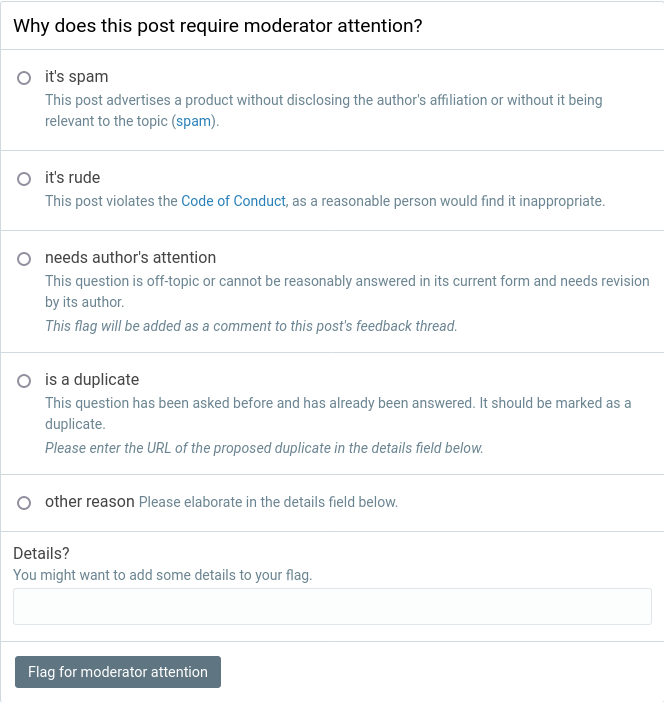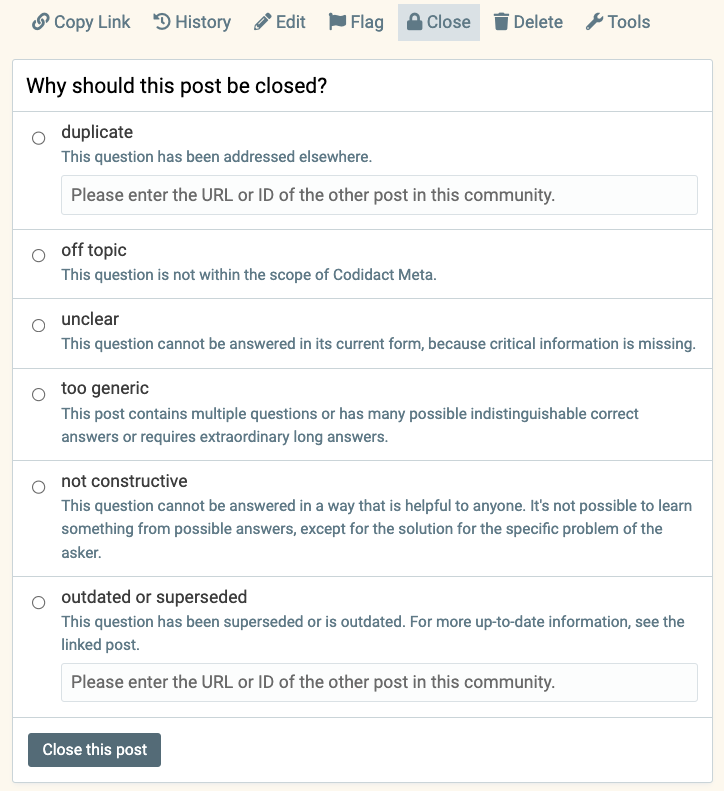Welcome to Codidact Meta!
Codidact Meta is the meta-discussion site for the Codidact community network and the Codidact software. Whether you have bug reports or feature requests, support questions or rule discussions that touch the whole network – this is the site for you.
Post History
As things stand, the options for flagging a question seem rather spartan: Image of flagging dialog We have: two options for actual abusive use of the site software an option for dupli...
#2: Post edited
Bringing bad posts to the attention of curators, not just moderators
- Bringing bad posts to the attention of curators, not just moderators - flagging vs closure reasons
As things stand, the options for flagging a question seem rather spartan. We have:- * two options for actual abusive use of the site software
- * an option for duplicates
- * "needs author's attention", which to my understanding isn't actually a flag at all and instead redirects to the comment interface
- * "other"
We know from those who have gone before us that it's necessary for curators to be able to close questions - to enforce minimum quality standards, but also because moderators simply won't always be available. One of the best ideas to emerge out of Stack Exchange is that of *community moderation* - i.e., the use of curation tools and privileges to, with some measure of consensus, take certain of the actions a moderator could perform unilaterally.- It's better if we prepare for this well in advance, because the results of being taken off guard are evidently truly awful (and cannot be fixed with even years of post-mortem discussion).
I'd like to open the floor to consider, and reconsider (vs. what others have tried), categories of good reasons to close questions - things that every community reasonably ought to agree is a proper closure reason in principle, in accordance with the vision of community Q&A that Codidact puts forward - so that community curators can be notified of issues, come to consensus, and relieve pressure on moderators.
- As things stand, the options for flagging a question seem rather spartan:
- <details><summary>Image of flagging dialog</summary>
- > 
- </details>
- We have:
- * two options for actual abusive use of the site software
- * an option for duplicates
- * "needs author's attention", which to my understanding isn't actually a flag at all and instead redirects to the comment interface
- * "other"
- On the other hand, the current closure options (for those who have the privilege to vote to close) apparently look like (credit to Monica for the screenshot, from the Discord):
- <details><summary>Image of closure dialog</summary>
- > 
- </details>
- Aside from "duplicate", there's one more option for linking to another Q&A, and then four things that... all seem to me like major sub-categories of "needs author's attention". (Well, except for "off topic", which is normally not fixable.) I want to emphasize here: **posts that "need the author's attention"**, at least in the main Q&A section of a site, **inherently should be closed**. This is a claim that the question either can't properly be answered, or is not a suitable part of a reference Q&A, for reasons that only the author can address. Therefore, *nobody should be trying to write an answer* - but we know from the results in other places that people eventually *will* try.
- It's better if we prepare for this well in advance, because the results of being taken off guard are evidently truly awful (and cannot be fixed with even years of post-mortem discussion).
- I have three related purposes in mind with this post.
- 1. I propose that the **flagging options should explicitly incorporate all appropriate closure reasons**, not just duplicates. (There's nothing really special about duplicates, anyway. The author can even fix that problem in many cases.) It should also make these *actually function as flags*, in addition to prompting for optional feedback, because they are *logical reasons to close the question*.
- 1. I propose that **users with the vote-on-holds and curation abilities** - not just moderators - **should be notified** in some way about flags that relate to closure reasons (including duplicates), and I'm looking for suggestions about how this should work. I don't think (for now!) that any number of flags should automatically close or delete a post; but for people who can cast votes, it's clearly better if the rest of us can help focus their attention on what's most likely to need attention. This also entails that the "Why does this post require moderator attention?" header requires rethinking.
- 1. I'd like to open the floor to **reconsider** (vs. what others have tried), categories of good **reasons to close questions** - things that every community reasonably ought to agree is a proper closure reason in principle, in accordance with the vision of community Q&A that Codidact puts forward - so that community curators can be notified of issues, come to consensus, and relieve pressure on moderators. (When I originally posted this, I was unaware that there was already a list - because I naively assumed that the flagging options would reproduce that list. However, I still see room for improvement.)
#1: Initial revision
Bringing bad posts to the attention of curators, not just moderators
As things stand, the options for flagging a question seem rather spartan. We have: * two options for actual abusive use of the site software * an option for duplicates * "needs author's attention", which to my understanding isn't actually a flag at all and instead redirects to the comment interface * "other" We know from those who have gone before us that it's necessary for curators to be able to close questions - to enforce minimum quality standards, but also because moderators simply won't always be available. One of the best ideas to emerge out of Stack Exchange is that of *community moderation* - i.e., the use of curation tools and privileges to, with some measure of consensus, take certain of the actions a moderator could perform unilaterally. It's better if we prepare for this well in advance, because the results of being taken off guard are evidently truly awful (and cannot be fixed with even years of post-mortem discussion). I'd like to open the floor to consider, and reconsider (vs. what others have tried), categories of good reasons to close questions - things that every community reasonably ought to agree is a proper closure reason in principle, in accordance with the vision of community Q&A that Codidact puts forward - so that community curators can be notified of issues, come to consensus, and relieve pressure on moderators.


















